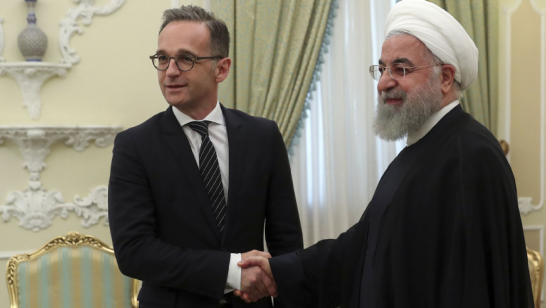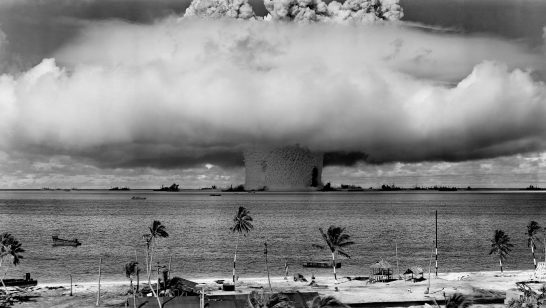
In spite of tens of thousands of victims, no solution to the Syrian crisis has been found on international humanitarian grounds, or any other. Alternative issues and avenues now have to be explored, however, especially with regard to the question of chemical weapons (CW).
It is very likely that the Syrian armed forces possess chemical weapons but according to existing arms control norms applicable to Syria, possession of chemical weapons, per se, is not, a violation. The precedent of the alleged WMD possession by Iraq in 2003 and the caution with which the Iranian nuclear issue is presently being handled, require that the Syrian issue be based on solid factual and legal grounds. Evidence coming from intelligence sources is a key element, but it can hardly be invoked as a legal basis: governments are reluctant to unveil their sources and to expose their agents. They can also “doctor” the information they divulge. A Syrian high ranking defector did recently mention the regime’s plans to use chemical weapons, but defectors are not always a reliable source. A spokesman of the Syrian Ministry of Foreign Affairs also hinted, last July, that his country would only use chemical weapons against an external aggressor, but the statement was subsequently denied. The most solid and unchallengeable indication of Syrian chemical weapons possession is that Syria did not adhere to the Chemical Weapons Convention of 1993 (CWC) which provides for a total prohibition of possession and use of such weapons and imposes obligations for their elimination.
The Convention is supported by a robust verification mechanism which includes challenge inspections to suspected sites “in any place at any time”. Like Egypt, Syria’s unwillingness to sign (Israel has signed but not ratified), means there is no legal nor political obligation to abide by it. An ad hoc UN Security Council resolution establishing a special commission similar to the ones (UNSCOM and UNMOVIC) created for Iraq in 1991 and 2003, would be an appropriate instrument to ascertain the possession of chemical weapons for sure (UNMOVIC is still in operation). But Syria has two powerful protectors in the Security Council: Russia and China. As permanent members, they can veto or threaten to veto any UNSC resolution. They have not hesitated to do so when the Syrian case has been brought to the Security Council.
Short of a Council resolution, the main consequence of possessing chemical weapons is the international blame and stigmatization for not having joined an international norm shared by 188 out of 193 members of the UN. But at this stage of the Syrian crisis, stigmatization and blame are no longer a major concern to the Syrian regime.
Using chemical weapons against another state would put Syria in a different situation: in 1986 the country joined the 1925 Geneva Protocol prohibiting the” use in war” of chemical weapons. Egypt, Israel, and practically all Middle Eastern states are party to this Protocol. Even if attacked with chemical weapons Damascus would not be allowed to respond in kind since, at the moment of joining the Protocol, it did not make the reservation that it would “cease to be bound by the Protocol in regards to any enemy state which does not observe the prohibitions of the Protocol”.
Thus, last July’s statement on a possible use of chemical weapons against an aggressor was contrary to the spirit of Syrian obligations: but it was not a crime since it was a mere declaration, subsequently denied, not a policy statement followed by any Syrian action. The threat of use is not contemplated by the Geneva Protocol. Only by using these weapons “in war” (i.e. against a foreign state) would Syria be violating international law.
In sum, except in the case of use of CW against another state, there are few foreseeable circumstances allowing the international community to bring Syria, or its leaders, to international justice on legal arms control grounds. Even the use of such weapons against its own population is not legally prohibited by the Protocol. But in the latter case the international uproar would be such that even Syria’s staunchest protectors could hardly resist the pressure for immediate action coming from the international community.
It would be politically and militarily foolish for President Assad’s regime to use or threaten to use chemical weapons against an internal or external foe. It would be even more foolish to supply such weapons to other states not to speak of giving them to non state actors and in particular to terrorist groups. In view of Syria’s open or suspected links with such entities, this is not an implausible hypothesis. A loss of control over chemical stocks, in the case of an intensification of the civil war, is also not implausible. In all these cases Syria would fall under the jurisdiction of UN Security Council resolution 1540 which defines proliferation of weapons of mass destruction “a threat to international peace and security” under Chapter 7 of the UN Charter. This would allow the imposition of further sanctions and even the use of force by the international community. In case of the use of chemical weapons by Syria, neighbouring countries party to CWC, could also invoke assistance and protection under article 10 of the CWC.
Whoever rules Syria in future, will be walking on thin ice with regard to chemical weapons and will have an interest in reassuring the international community and the rest of the Middle East by immediately adhering to the Chemical Weapons Convention. Other states in the region should follow suit. Chemical weapons have no strategic value, they are instruments to disseminate terror but not to win wars. They are not credible as a deterrent. Their possession and use are not sustainable.
By joining the Convention, a future Syria government would receive the cooperation of the Organization for the Prohibition of Chemical Weapons (OPCW) and the international assistance foreseen by Resolution 1540. It would also be eligible to receive technical and financial support for the elimination of such weapons through the Global Partnership against the proliferation of WMD, a G8 mechanism which was legitimized by the UN Security Council in 2009. Such a gesture would be a good omen for initiating the process for the establishment of a Zone free of weapons of mass destruction in the Middle East, a project in need of new thinking and of bold initiatives especially after the recent postponement of the date of the foreseen conference. In any case both the future authorities in Syria and the international community need to be ready to address the issue of chemical weapons in that country with some urgency.
The opinions articulated above represent the views of the author(s), and do not necessarily reflect the position of the European Leadership Network or any of its members. The ELN’s aim is to encourage debates that will help develop Europe’s capacity to address the pressing foreign, defence, and security challenges of our time.



